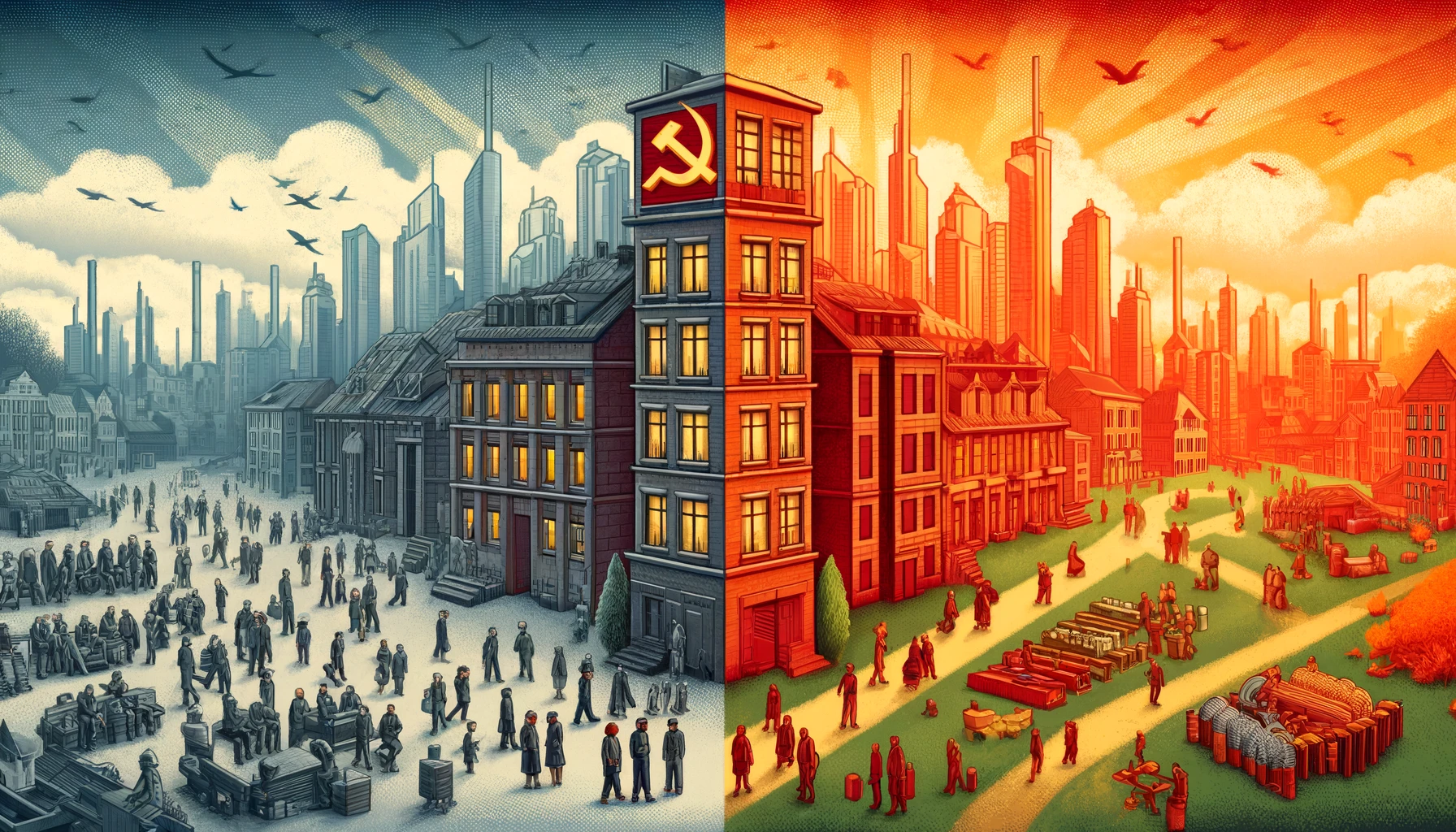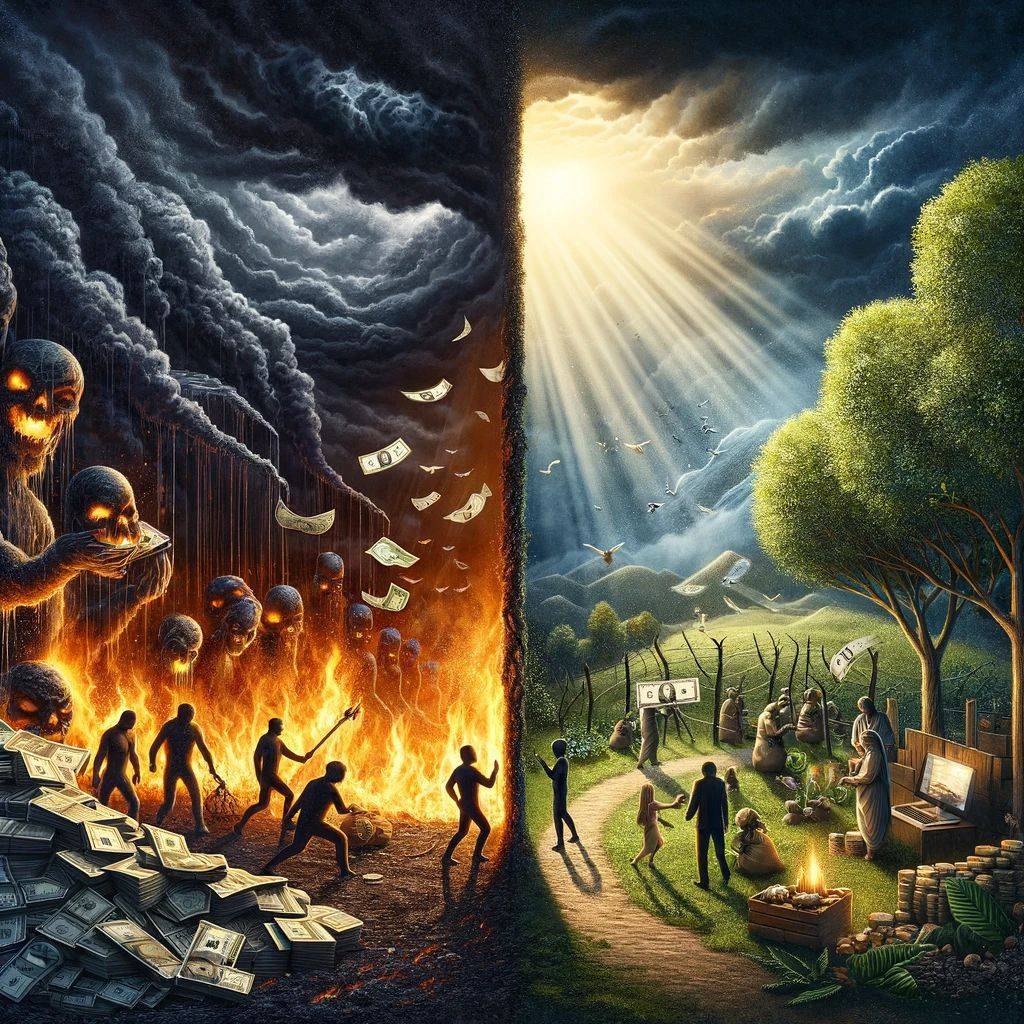Was there any communist country in the history of the universe? Error 404: Not Found
There are some countries known to be as communist countries like China, Cuba, North Korea and the former USSR, but by definition, there hasn’t been a true communist country in the world. Every “Communist Country” is actually a Socialist country with the government controlling the employment and economy to some degree.
But what’s the meaning and difference between the two? To understand this let’s dive into their definition.
Communism
Communism is basically like the ultimate equality hack. Picture this: everyone gets to vibe on the same level, no matter where they’re coming from. It’s all about sharing the wealth, power, and opportunities so that nobody gets left behind. Sounds pretty lit, right? And when we are talking about communism, the names that comes into our minds are Marx, Engels and Lenin. Let’s talk about them and their theories next.
Karl Marx and His Theory
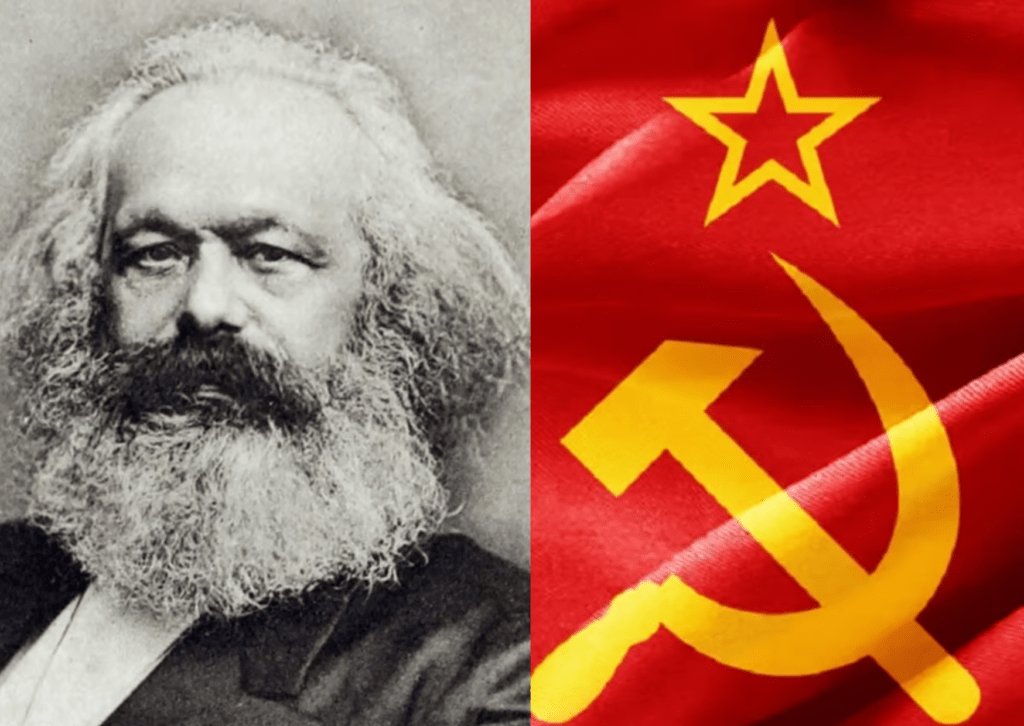
Karl Marx, a German philosopher born in 1800s, was really into fairness, especially for factory workers. He thought things were kind of messed up and that everyone should have a shot at a good life. Marx became known for his writings, like the famous “Das Kapital,” where he talked about his ideas for a more equal society. These ideas, called Marxism, are still big topics today, even if people don’t always agree with them. No doubt though, Karl Marx was a big thinker who left his mark on the world.
Grandpa Marx divided the society into two class : Bourgeoisie: rich and ruling class who owns most of the lands, mines and factories and earn profit by selling goods. Another one is Proletariat: which is the poor working class ruled by Bourgeoisie.
Marx said that a class struggle was going on between the two class and eventually working class would be able to stand this no longer. Then they would join together into a revolution to get rid of ruling class. After taking the control, the workers would take control of Government and run the country for the benefit of the workers. Land and property would be shared out and everybody will have equal rights. But because the ruling class might try to get their power back a strong government would be needed for sometime. Eventually everyone would come to accept this new kind of society. There would no longer be any need for a government or police. People would work to produce whatever they could and share this with each other. Karl Marx called this communism.
Marx’s ideas are super complex, and there’s a lot more to them than this. Some people think communism is a total vibe, while others think it’s a recipe for disaster. The important thing is that Marx got people thinking critically about society and how to make things fairer.
Friedrich Engels and His Theory
Friedrich Engels, born in 1820, was the ride-or-die buddy of Karl Marx. Engels wasn’t exactly poor – his family owned factories! But unlike most rich kids, he saw how tough things were for the workers. Living in Manchester, England, he witnessed factory life firsthand, and it wasn’t pretty. This turned Engels into a champion for the working class. Engels was a big thinker in his own right, writing about families, war, and even women’s rights. Definitely not your typical rich dude of the 1800s!
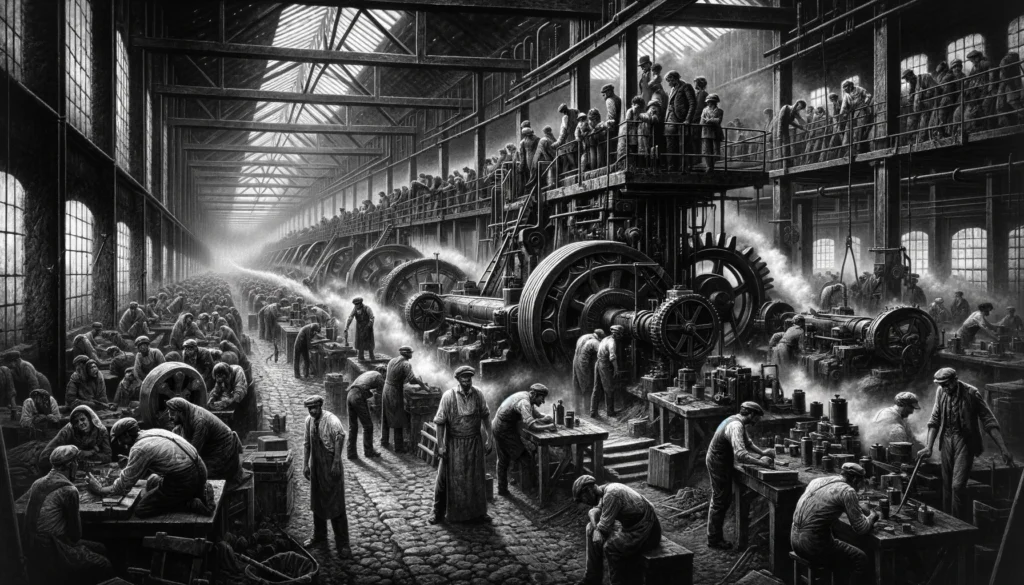
While Marx focused on the problems of capitalism, Engels zoomed out to explain how society got here. He basically said things started chill with everyone sharing, then farming came along and created rich landowners and poor peasants (kind of a bummer). Finally, capitalism showed up, all about competition and profit, which Engels thought squeezed workers. Just like Marx, he predicted a worker revolution overthrowing the system and creating a communist society where everyone contributes and benefits, kind of like a giant, happy co-op. Engels even looked at how these class struggles affected families and women’s rights. Together, their ideas are still sparking debates about fairness and the future of work. He teamed up with Marx, co-writing famous stuff like the Communist Manifesto, and even helped Marx pay the bills so he could keep writing.
Communist Manifesto
Two OGs: Grandpa Marx and Friedrich Engels wrote “The Communist Manifesto” in 1847. This manifesto was basically their way of spilling the tea on the whole capitalist system and how it’s keeping us all down. In the opening section of Manifesto, Marx and Engels say that the history of human society is a tale of class. When the Capital Class shatter the world’s hierarchies, it basically left two other classes : the middle class and the working class. As resources get more scarce and as markets get more saturated, it gets hard to turn a profit. So the only way to save money is to pay less and less for labor. That’s where The Manifesto’s most subversive points comes in. It says revolution is inevitable. In the next section of Manifesto, Marx and Engels describe what they think a society built by and for the working class might look like. One the Manifesto’s biggest ideas is that in a Working class future, the goal of production is not to make profit but to create access. Marx and Engels suggest that everyone should have equal access to the benefit of society, technology and resources.
Vladimir Lenin and His Theory
Vladimir Lenin’s (real name Vladimir Ulyanov) life wasn’t exactly radical – middle-class family, the whole deal. But then, BAM! His older brother gets executed for trying to overthrow the grumpy Tsar. That fired Lenin up. He dove headfirst into socialist ideas and became a big cheese in the Bolshevik party. In 1917, Lenin saw his chance. He led the Bolsheviks in a revolution (the October Revolution), kicked out the Tsar, and created the world’s first communist country, the Soviet Union. Lenin became its first leader, but things got messy. Civil war, one-party system – it wasn’t all sunshine and rainbows. Love him or hate him, Lenin’s revolution shook things up in Russia and beyond.
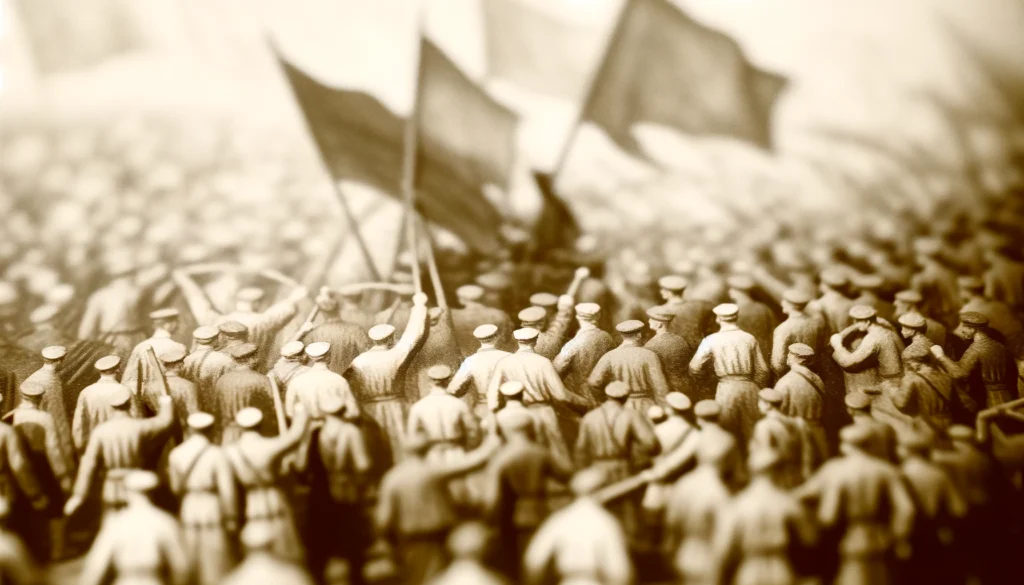
Lenin wasn’t content simply to be the revolutionary fire leading the October Revolution. He built on the foundations of Karl Marx’s theories and added his own twists that shaped Leninism. While Marx saw communist revolutions breaking out in the most advanced countries, fueled by a growing and increasingly disillusioned working class, Lenin saw a different path. He saw Russia, a nation in turmoil after the Tsar’s abdication, as a ripe opportunity. Here, he believed that a well-organized and highly committed group of revolutionaries could act as a spark to ignite the flames of change. This avant-garde party, unlike Marx’s more organic revolution, would not foresee widespread worker dissatisfaction. Instead, they would actively lead the revolution, leading the proletariat to a communist society. Lenin also saw another wrinkle in the capitalist system that Marx did not emphasize as much: imperialism. He argued that rich capitalist countries essentially bullied poorer countries by exploiting their resources and labor for their own benefit. Lenin believed that this could be a unifying factor for workers everywhere. Recognizing a common struggle against an unjust economic system that benefited the rich at the expense of the poor, Lenin hoped to bring about a global communist revolution. In addition to emphasizing the vanguard party in leading the revolution, these ideas became the fundamental principles of Leninism, an important addition to broader communist theory.
Socialism
According to Marx, Socialism is a precursor to Communism and the next logical step after Capitalism. In Socialism, a democratic state controls the means of production rather than having private companies hold ownership. Imagine a world where everyone chips in and nobody gets left behind. That’s socialism in a nutshell. It’s like your friend who always shares their fries without expecting anything in return—except on a massive scale. In a socialist society, the focus is on fairness and equality. It’s about making sure everyone has access to the basics—like healthcare, education, and a decent standard of living—no matter where they come from or how much they’ve got in the bank. Instead of competing with each other as in a Capitalist society, Socialism has workers contribute as much as they can. That’s Socialism.
Difference between Communism and Socialism
In a fully realised communist utopia, the idea is to eventually reach a point where there’s no government at all. Here’s the breakdown:
- Socialism (Level Up): After a big revolution to overthrow capitalism, a socialist state takes over. This is like the training wheels phase. The government is totally in charge, running the economy, and making sure everything is fair and square. Think of it as a necessary, but temporary, control to keep things from going off the rails.
- Communism (Final Boss): Once society levels up and hits peak equality and abundance, the state’s job is done, and it “withers away.” In this ultimate endgame, there’s no need for a government because everyone’s vibing together, managing resources collectively without formal structures. It’s all about the community running the show directly, no middleman needed.
Pros and Cons of Communism and Socialism
Think of a grand tea party, but with two very different approaches to hosting. Here’s a breakdown of Socialism and Communism, served with a dash of historical examples:
Socialism: The Tea Cooperative
Suppose there’s a potluck tea party and everyone brings something to share, but there’s still room for individual expression and ownership. The host (government) provides plates, and napkins, and maybe even brews a base tea (public services).
Successes
Nordic Nations: Nations with a strong emphasis on equality, robust social safety nets (healthcare, education), and good living standards include Sweden and Denmark. Similar to delectable desserts at a potluck, these characteristics support a contented and wholesome community.
Mixed Economies: A large number of capitalist nations also have some socialist components. For instance, social programs and worker rights are highly valued in Germany. It’s like a little squeeze of lemon into your tea—a subdued, yet welcome, departure from the norm.
Failures
Incentive Issues: A strictly socialist society may not provide enough incentives for creativity and diligence, much as a potluck dinner with an excessive amount of sweets.
Bureaucracy Blues: When there are too many cooks (government rules), the soup gets spoiled, which causes inefficiency and sluggish decision-making.
Communism: The Grand Tea Ceremony
It’s like a very formal tea ceremony, with strict rules and a single host. Everyone drinks from the same pot (shared resources), and the host (government) determines how much tea (wealth) each guest receives.
Successes:
Rapid Equality: In theory, communism can quickly eliminate social inequality, ensuring everyone gets a cup of tea (basic needs met). The Soviet Union, for a time, offered universal healthcare and education.
Mobilization for a Cause: Communism can be very effective in mobilizing resources for a common goal, as seen in China’s rapid industrialization.
Imagine everyone working together to brew a giant pot of tea for the entire nation.
Failures:
Loss of Individuality: Lack of personal property and strict regulations might inhibit motivation and innovation. It’s like having to drink tea you don’t like because there’s no other choice.
Power Imbalance: The host with absolute control (the government) can easily become corrupt, leading to human rights abuses. Think of a tea party where the host keeps all the good tea for themselves!
Economic Challenges: Centrally managed economies frequently face shortages and inefficiency. Imagine discovering there are no more teacups at the tea party when you arrive!
The Verdict: Finding the Right Cup
Both socialism and communism aim for a fair and just society, but their methods differ greatly. Socialism offers a more flexible approach, balancing individual liberties with social welfare. Communism strives for total equality but risks sacrificing individual freedoms and economic efficiency.
Perhaps in the middle is where the ideal tea party would be held. It involves striking the ideal balance between everyone’s fair share, personal preference, and pooled resources.
IRL (In Real Life)
But here’s the plot twist: no country has actually pulled this off. Attempts at communism, like the Soviet Union or Maoist China, ended up with super strong, centralized governments that never moved past the transitional phase. These regimes often turned into hardcore authoritarian states instead of fading into the background.
So, while the dream is a chill and stateless society where everyone shares and thrives, the reality has been governments holding onto power. The ideal is to eventually have no government, but getting there is a whole different story.
In short, a true communist society would mean no government at all—just people living their best lives, sharing everything and making decisions together. But in real life, getting to that point has proven to be way more complicated, often leaving us stuck in the “level up” phase with governments that are anything but temporary.
Frequently Asked Questions(FAQs)
Communism aims to create a classless, stateless society with shared resources, while socialism seeks to regulate capitalism and promote equality through government intervention.
Karl Marx, Friedrich Engels, and Vladimir Lenin are widely recognized as the most influential thinkers in the development of communism.
The Communist Manifesto is a foundational text of communism, written by Karl Marx and Friedrich Engels, which outlines the principles of the communist revolution.
Marxism is a social, political, and economic theory developed by Karl Marx that analyzes the capitalist society and advocates for a communist revolution.
Leninism is a political ideology developed by Vladimir Lenin, emphasizing the role of a vanguard party in leading the communist revolution.
The Soviet Union, founded by Vladimir Lenin in 1922, is considered the first communist country in history.
Critics argue that communism leads to authoritarianism, economic inefficiency, and suppression of individual liberties.
While some countries claim to be communist, there are no countries that have fully implemented a communist system in practice.
